Germany jolted by AfD right-wing poll success
- Published
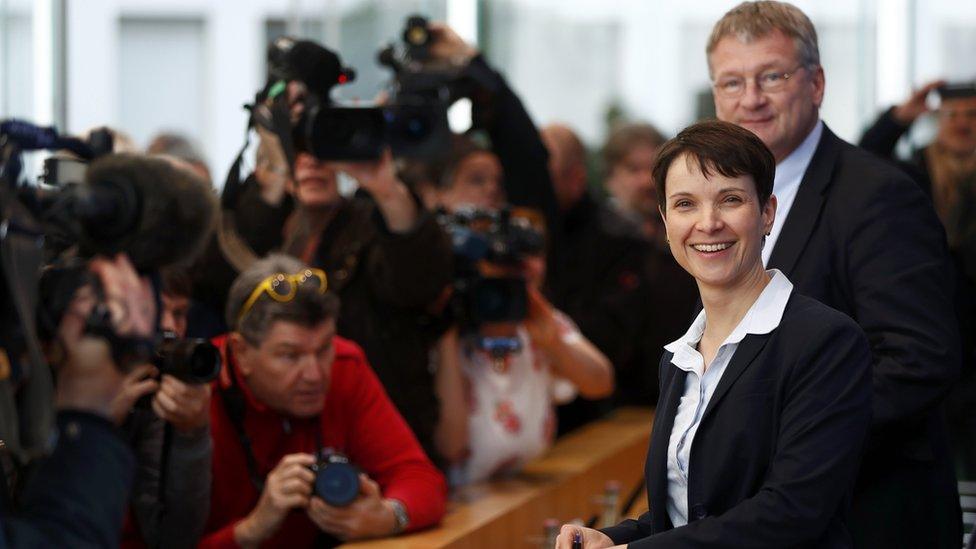
Frauke Petry's AfD won almost a quarter of the vote in Saxony-Anhalt, coming second behind the CDU
"I don't see it as an existential problem for the CDU, but I do see it as a problem," Chancellor Angela Merkel admitted as she summed up her centre-right party's poor performance in key regional elections in three German states on Sunday.
German politics is suddenly looking a lot less predictable and potentially less stable.
It's all because of the astonishing success of the anti-migrant Alternative for Germany (AfD). Many German voters appear rattled by the large numbers of refugees and migrants arriving in Germany - 1.1 million in 2015 alone.
Politicians are now getting down to the nitty-gritty of coalition-building. But all the cards have been thrown up in the air so it's a question of seeing where they will settle. And it's going to get messy.
German Chancellor Angela Merkel: "Yesterday was a difficult day"
Splintered politics
Each of the three regional premiers should be able to hang on to power.
Popular Green party Premier Winfried Kretschmann, of the south-western state of Baden-Wuerttemberg, has shown that the Greens' success in what used to be a conservative heartland is not just a blip from a 2011 election held in the aftermath of Japan's Fukushima nuclear power plant disaster.
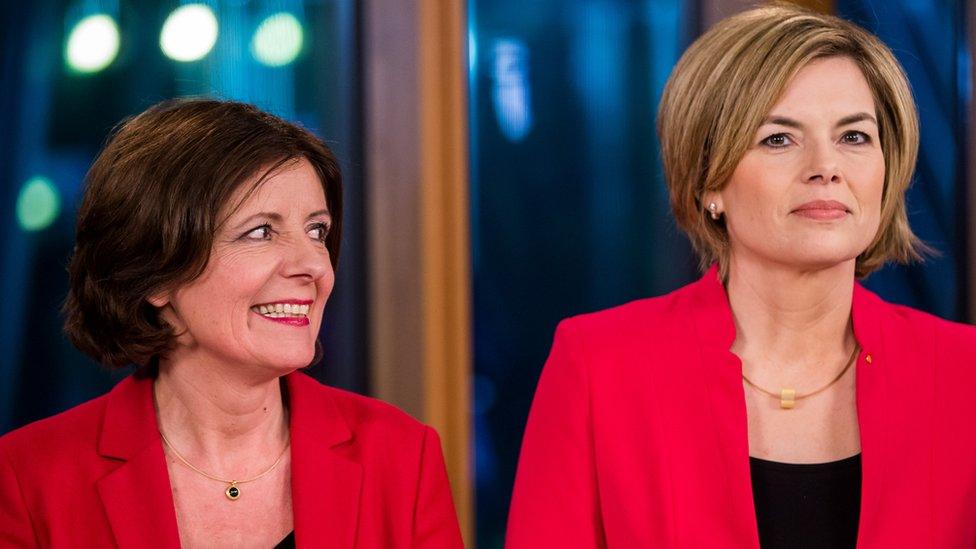
Rhineland-Palatinate Premier Malu Dreyer (pictured) overcame a challenge from up-and-coming CDU politician Julia Kloeckner
Centre-left SPD Premier Malu Dreyer, of Rhineland-Palatinate, confidently saw off the CDU's promising rising star Julia Kloeckner by rather bizarrely doing a better job at imitating Mrs Merkel's centrist stance on refugees than the chancellor's own candidate.
CDU Premier Reiner Haseloff also held on in the eastern state of Saxony-Anhalt, where AfD polled almost a quarter of the vote.
But this is far from a continuation of the status quo. They will have to govern with new, and in some cases untested, coalition partners.
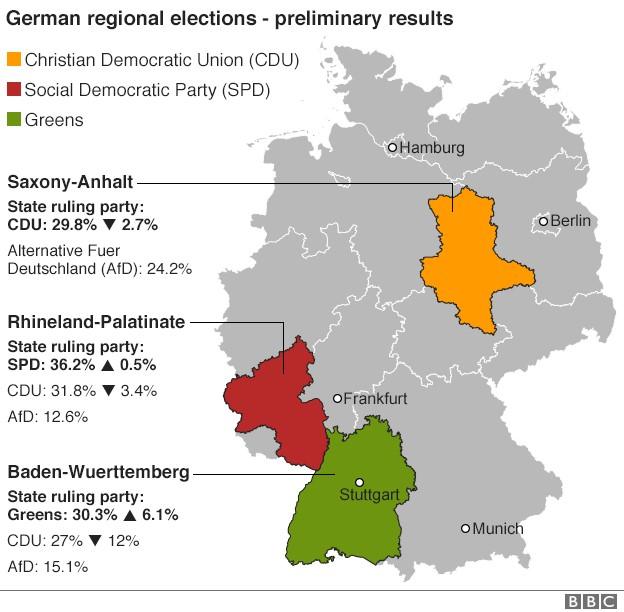
Gone are the days of two major parties, one on the right, one on the left.
German politics has become splintered.
Smaller, more radical parties are gaining influence. And adventurous coalition combinations are now possible, including in Saxony-Anhalt, where a distinctly uncomfortable menage-a-trois between centre-right CDU, centre-left SPD and the left-wing Greens looks like the only feasible option.
The right-wing AfD's tough populist talk has attracted voters angered by the influx of migrants, chipping away at the traditional support base on both the left and the right - conservative voters who are disenchanted with Angela Merkel's pro-refugee approach as well as blue-collar left-wingers who feel nervous that state spending on migrants will undermine their own position in society.
The big question is what this means for Angela Merkel's stance on refugees. Closed borders along the Balkan route have effectively already slammed shut her open door invitation to Syrian refugees.
No credible rivals
But Mrs Merkel's pro-refugee rhetoric has barely changed. She still believes Germany, and indeed the rest of Europe, has a responsibility to shelter people fleeing war. She refuses to contemplate a cap on numbers coming to Germany.
"We need a European solution and this solution needs time," she told journalists in Berlin on Monday afternoon.
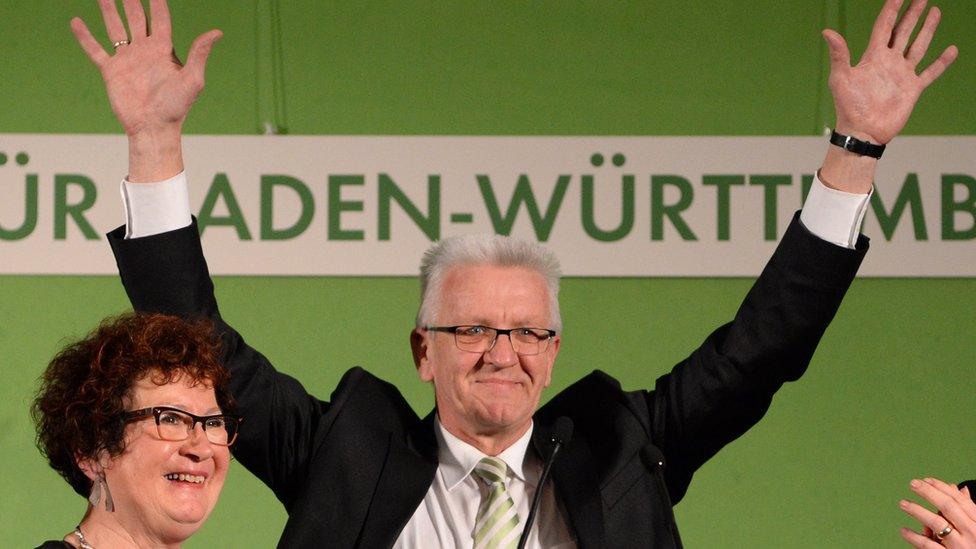
Baden-Wuerttemberg's Green Party Premier Winfried Kretschmann saw off a challenge from the CDU
So have these elections undermined Chancellor Merkel's leadership? Yes and no.
The gains of the AfD will certainly embolden conservative critics within her own ranks, who accuse her of betraying right-wing values, by dragging her party to the centre-ground.
Awkwardly, many of Mrs Merkel's supporters on the refugee issue are in opposing left-wing parties. Not a great help when it comes to managing her own political bloc.
But Angela Merkel still has no credible rivals within her government and no other party or politician has yet come up with a popular viable solution for the migrant crisis either.
Despite the success of the AfD, this election campaign has shown that her approach still enjoys the support of mainstream society.
It was the candidates, whether on the left or the right, who backed her approach who won out.
In Rhineland-Palatinate for example, voters were treated to the astonishing sight of a TV duel in which the centre-left Malu Dreyer argued with CDU Julia Kloeckner over who was most loyal to Mrs Merkel's position on refugees.
It is not so much Angela Merkel who has been punished by these elections, as her increasingly divided government.
- Published12 March 2016
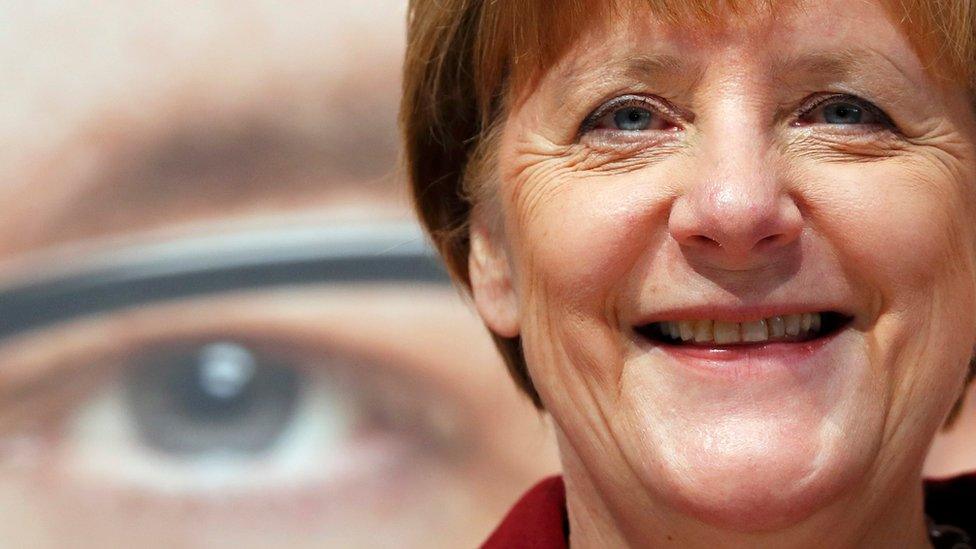
- Published10 March 2016